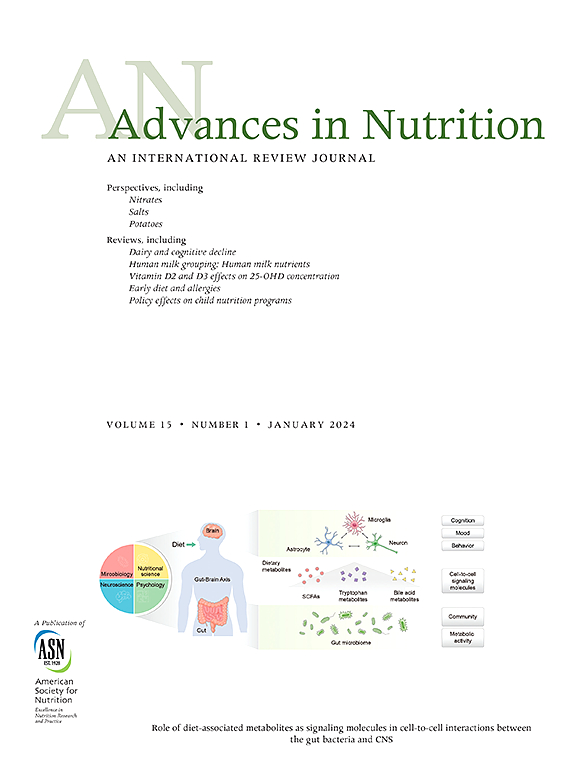Targeting Cognitive Resilience through Prebiotics: A Focused Perspective
IF 8
1区 医学
Q1 NUTRITION & DIETETICS
引用次数: 0
Abstract
This perspective article is a product of the work of an expert group within the Prebiotic Task Force convened by the International Life Sciences Institute Europe, a non-profit organization that brings together experts from academia, industry, and public service to catalyze nutrition science for public benefit. An expert group was conceived in October 2023 to discuss the evidence base on the use of prebiotics to promote cognitive functioning, with a focus on highlighting knowledge gaps and proposing a list of recommendations to guide this specific area of research forward. To address this, we evaluated existing systematic reviews and meta-analyses of human intervention studies that examine the effects of prebiotics on cognitive functioning. These are predominantly conducted in healthy participants under basal conditions and have, to date, revealed limited effects. In this perspective, we propose that prebiotics should be investigated as agents to promote cognitive resilience by testing their effects on cognitive performance under certain cognition-taxing factors that individuals encounter across their lifespan. These include stress, poor sleep outcomes, sedentary behavior, and unhealthy dietary patterns, all of which have been shown to be associated with altered microbiome and impact global cognition or specific cognitive domains. In addition, we recommend identifying vulnerable populations that are either subclinical or that struggle chronically or periodically with 1 or more cognition-taxing factors, to better uncover the boundary conditions for prebiotic effectiveness. By broadening the scope of research to include diverse populations and challenging conditions in daily life or experimental settings, we can expand our understanding of the role of prebiotics not only in cognitive health or impairment, but also as potential preventative agents that may promote cognitive resilience during aging and in response to various lifestyle-related challenges.
通过益生元提高认知能力:聚焦视角。
本视角文章是欧洲国际生命科学研究所(ILSI Europe)召集的益生元特别工作组内的一个专家小组的工作成果,ILSI Europe是一个非营利组织,汇集了来自学术界、工业界和公共服务部门的专家,以促进营养科学为公众造福。2023 年 10 月,我们成立了一个专家小组,讨论使用益生元促进认知功能的证据基础,重点是强调知识差距,并提出一系列建议,以指导这一特定领域的研究向前发展。为了解决这个问题,我们评估了现有的系统综述和荟萃分析,这些综述和分析研究了益生菌对认知功能的影响。这些研究主要是在基础条件下对健康参与者进行的,迄今为止所揭示的效果有限。从这一角度出发,我们建议将益生元作为促进认知复原力的药物进行研究,方法是测试益生元在人的一生中遇到的某些影响认知的因素下对认知表现的影响。这些因素包括压力、睡眠质量差、久坐不动的行为和不健康的饮食模式,所有这些因素都已被证明与微生物组的改变有关,并对整体认知或特定认知领域产生影响。此外,我们建议确定亚临床或长期或周期性地与一种或多种影响认知的因素作斗争的脆弱人群,以便更好地揭示益生菌有效性的边界条件。通过扩大研究范围,将日常生活或实验环境中的不同人群和具有挑战性的条件纳入其中,我们不仅可以扩大对益生元在认知健康或认知障碍方面作用的了解,还可以将其作为潜在的预防药物,在衰老过程中以及在应对各种与生活方式相关的挑战时促进认知恢复能力。
本文章由计算机程序翻译,如有差异,请以英文原文为准。
求助全文
约1分钟内获得全文
求助全文
来源期刊

Advances in Nutrition
医学-营养学
CiteScore
17.40
自引率
2.20%
发文量
117
审稿时长
56 days
期刊介绍:
Advances in Nutrition (AN/Adv Nutr) publishes focused reviews on pivotal findings and recent research across all domains relevant to nutritional scientists and biomedical researchers. This encompasses nutrition-related research spanning biochemical, molecular, and genetic studies using experimental animal models, domestic animals, and human subjects. The journal also emphasizes clinical nutrition, epidemiology and public health, and nutrition education. Review articles concentrate on recent progress rather than broad historical developments.
In addition to review articles, AN includes Perspectives, Letters to the Editor, and supplements. Supplement proposals require pre-approval by the editor before submission. The journal features reports and position papers from the American Society for Nutrition, summaries of major government and foundation reports, and Nutrient Information briefs providing crucial details about dietary requirements, food sources, deficiencies, and other essential nutrient information. All submissions with scientific content undergo peer review by the Editors or their designees prior to acceptance for publication.
 求助内容:
求助内容: 应助结果提醒方式:
应助结果提醒方式:


